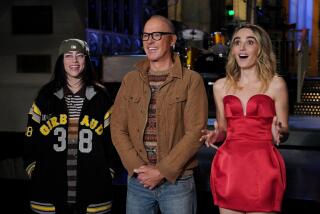âLouder, Faster, Funnierâ Is Formula for Comedy in Tiffany Theatreâs Farcical Whodunit
Who is the Stagedoor Slasher?
The suspects are a hammy, boozy, lecherous, name-dropping lot, gathered together at Ella Von Grossenkneutenâs country estate, ostensibly to rehearse a new musical. But actually theyâre part of a police investigation to flush out the murderer--and, if possible, nab a few maniacal German spies.
Itâs all in fun in John Bishopâs period whodunit, âThe Musical Comedy Murders of 1940,â playing at the Tiffany Theatre. Itâs a madcap farce brimming with mistaken identities, arch dialogue and nonstop action.
âPace is something I insisted on,â director Michael Keenan said. âIt has to go so fast, the audience never really has a chance to think. For one week during rehearsals, all I said was, âLouder, faster, funnier.â We also did some Italian runs, where you do the play--really acting it--as fast as you can; that sets the standard, and then you slow it down from there. But that came after weeks and weeks of establishing the beats, setting everything in place.â
Orchestrating the action--which includes multiple murder attempts among 10 characters, three hidden passages and innumerable comings and goings--also meant an enormous amount of physical business.
âIf you stand at the wrong place at the wrong time, you can be killed,â Keenan quipped. âIf youâre doing âHamletâ or âMacbeth,â you can be relaxed. But farce is tense, difficult. You have to do very technical work and make it look as if itâs the easiest thing in the world.â
Donna Emett has an actorâs feast in dual roles: as the quickly bumped-off maid Helsa Wenzel and Helsaâs evil brother Dieter, a snarling Nazi whoâs running around impersonating his sister.
âItâs great to bring people to tears and move them, but laughterâs really where itâs at for me,â said the actress, who came from New York for this show. âIn college, I always played character women and old ladies because I could do dialects, throw my voice different ways, age it.â
The role of Dieter, she added, is enjoyable both in its physicality and below-the-surface intensity: âDieter is always listening, watching--and so am I. Even when Iâm offstage, I stay close, listening to whatâs going on.â
Presented under the auspices of M Street Productions, âMusical Comedy Murdersâ has also served as a happy reunion for Emett and a group of her former classmates at Syracuse University: producer George Miserlis and cast members Sam Lloyd, Mark Snelson and Kevin M. Richardson.
Keenan, who staged a recent revival of âMr. Robertsâ at the Colony, was brought in by cast member Antony Carbone, a fellow instructor at the American Academy of Dramatic Arts in Pasadena. Keenan directs two shows a year there, and teaches classes in on-camera acting and stage auditioning.
Raised in San Marino, he got a masterâs in fine arts in acting from UCLA, then spent several years in regional theater--at the Asolo in Sarasota, Fla.; San Diegoâs Old Globe, South Coast Repertory and Seattle Rep. It was at the Globe that he made his directing debut with âLast Meeting of the Knights of the White Magnoliasâ in 1975.
âSuddenly I found myself a director and have been doing both ever since,â he said. âI really consider myself a director and am much more comfortable with that. But I donât turn down the other work.â
The director draws no distinction between the value of âimportantâ drama versus âlightâ comedy. âI think entertaining people is a noble profession,â he said. âWhen youâre asking people to plunk down 20 bucks, you have an obligation to present the material as truthfully as possible--whether its âManny, Moe & Jack Meet Santa Clausâ or âKing Lear.â
âOf course, the approach is different. With a highly technical farce, a lot of energy goes into finding the stage business, making it funny, perfecting the physical comedy, detail work. With a serious piece, tone is more important; if thatâs right, detail takes care of itself. I see my own job as head storyteller, responsible to see that the story is told correctly. But I really direct by the seat of my pants: If Iâm bored and squirming, I figure the audience will be too.â
More to Read
The biggest entertainment stories
Get our big stories about Hollywood, film, television, music, arts, culture and more right in your inbox as soon as they publish.
You may occasionally receive promotional content from the Los Angeles Times.










